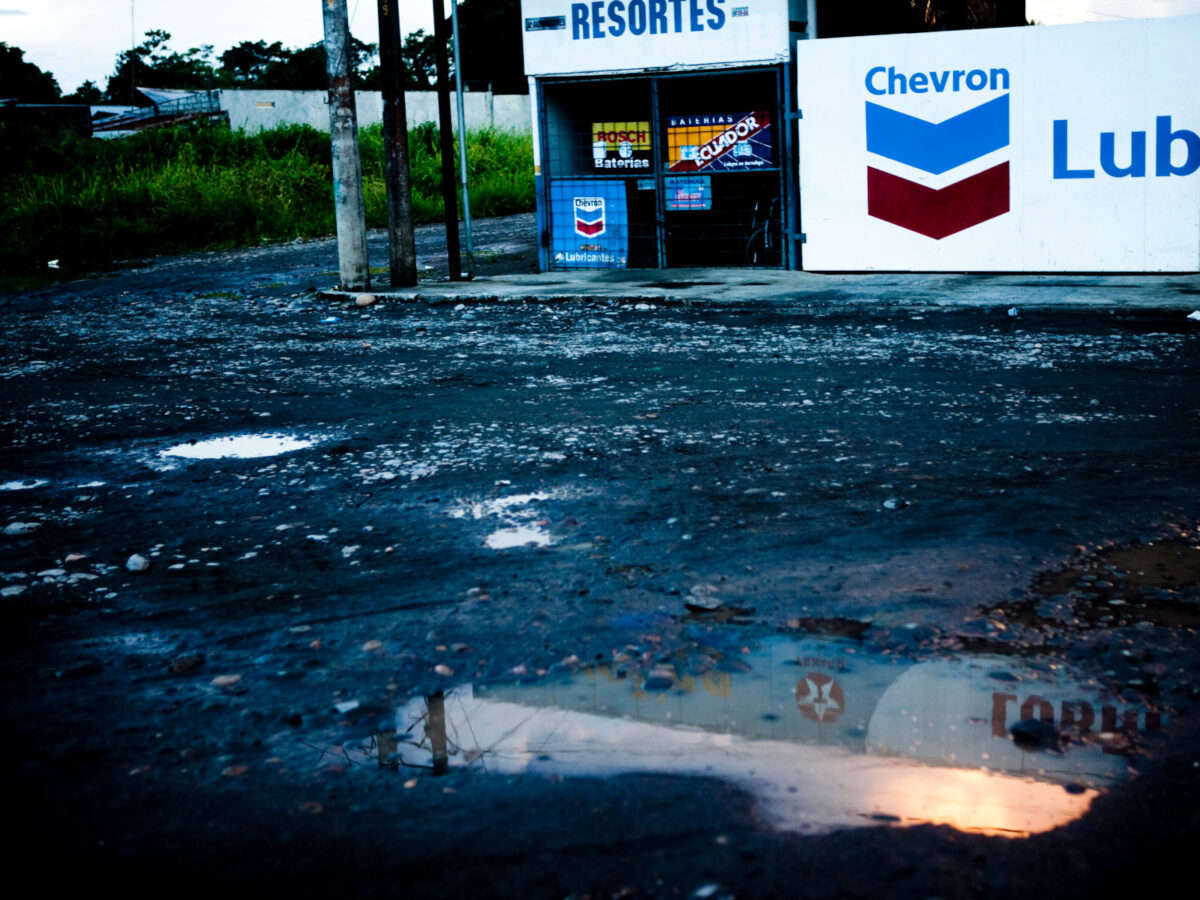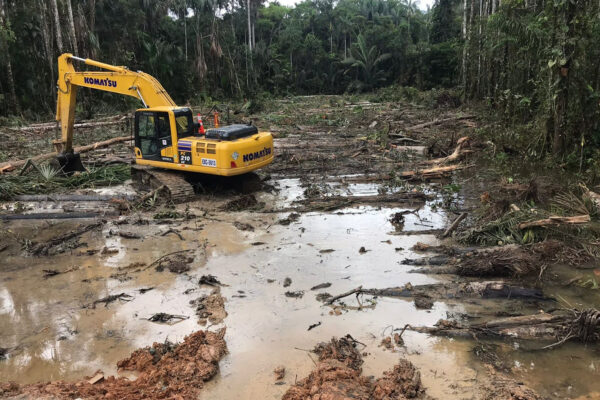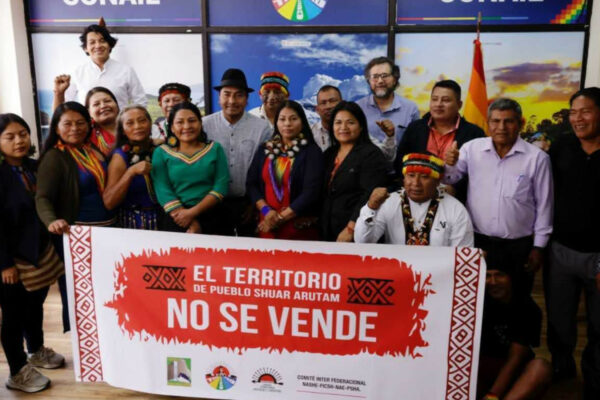Ecuadorian voters sent a clear message to President Daniel Noboa on Sunday, in the country’s second referendum vote in under a year: they want security, but they saw through his attempt to sneak through right-wing economic reforms.
While voters approved a majority of ballot measures on security aimed at addressing violence from organized crime and the “internal armed conflict” that has spiraled out of control and saw two mayors killed last week, they rejected a key component of his economic agenda and lynchpin of a free trade deal under negotiation with Canada.
By a wide majority, Ecuadorians said no to “Question D” that would have returned the country to systems of international arbitration over oil, mining, and other commercial disputes. The country has a long history on the losing end of arbitration, at great cost to its sovereignty, judiciary, communities, and ecosystems at the hands of companies like Chevron and other multinationals. Voters also rejected a measure that would have rolled back labor laws and workers’ rights.
A vote for security
Ecuador has gone from being considered an “island of peace” in the region to facing an alarming reality over the last five years. According to recent reports, at the end of 2023, the South American country has experienced a drastic increase in violence, with a worrying record of some 7,878 violent deaths. The homicide rate stands at 46.5 per 100,000 inhabitants, making Ecuador the most dangerous country in the region.
The nine security questions approved make several measures established during a state of emergency declared in January permanent, such as the ability to deploy the country’s military domestically in support of the police. Other reforms increase penalties for serious crimes, establish greater control over the possession and use of firearms, and will now allow extradition of accused crime bosses.
While the mandate from Ecuadorians is clear that security is a major priority for the country, concerns have been raised over rights abuses associated with unfettered crackdown on crime, unfounded labeling of Indigenous and civil society leaders as “terrorists,” and how future governments might abuse these powers in response to protests in a country that has long history of civil society mobilization and Indigenous uprisings.
A vote against international arbitration mechanisms
Noboa, a right-wing businessman and son of a banana baron, hoped to return the country to the international arbitration system as he courts investors and free trade deals. The country rejected this system during the tenure of former President Rafael Correa, when Ecuador adopted a new constitution in 2008, in which Article 422 explicitly prohibits “treaties or international instruments where the Ecuadorian state yields its sovereign jurisdiction to international arbitration entities in disputes involving contracts or trade between the state and natural persons or legal entities.”
Question D of the referendum would have allowed bilateral trade and investment agreements to include international arbitration mechanisms to resolve disputes.
But some 64.8% of the population voted down the proposal, and put the regime’s intentions in check to advance negotiations of a free trade agreement with Canada, a country widely questioned for exercising improper economic diplomacy to favor its oil and mining companies and conceal its responsibility for demonstrated violations of the human rights of impacted communities, destruction of the environment, and fundamental disrespect for the self-determination of indigenous peoples.
“Today is a historic day. We have sent a clear message to Noboa. We will not be fooled, and we have not forgotten. Ecuador is not for sale. We won’t let our environment, our rights, our territories, and our sovereignty be put at the mercy of some secret investor tribunal,” said Zenaida Yasacama, Vice President of the National Federation of Indigenous Nationalities of Ecuador (CONAIE).
Ecuador’s losing battle with ISDS
Investor-State Dispute Settlements (ISDS), a set of rules where host countries can be sued by foreign investors for state actions that affect the value of their investment in unaccountable arbitration courts, has not gone well for Ecuador. The country has faced 29 ISDS lawsuits filed by foreign investors to date. Half of these are related to extractive sectors such as hydrocarbons and mining. Ecuador lost two-thirds of its concluded cases, resulting in payments of $2.9 billion to foreign investors, and undermined the country’s sovereignty, judiciary, rights of communities, and the environment along the way.
A case in point is the current arbitration brought by Chevron against Ecuador for “moral damage” and legal fees after the company was found guilty by Ecuadorian courts – the company’s forum of choice – for egregious environmental crimes and rights violations. Chevron was ordered to pay $9.5 billion for remediation, clean water, and health care for some 30,000 Indigenous people and campesinos who have been waiting for justice for over 30 years. Chevron has refused to pay and has been on the run ever since.
By rejecting Referendum Question D, voters sent a clear message that companies like Chevron must be held to account. It complicates the company’s attempt to evade the judgment against it and deny justice to affected communities. And it puts the government on notice if it is considering selling out its own people and bailing out an oil giant responsible for one of the worst oil disasters on the planet.
“If protecting nature, protecting our rights, and the climate threatens a company’s investment, then that’s a problem,” said Donald Moncayo, President of the UDAPT (Union de Afectados por Texaco). “Companies like Chevron should be punished for contamination and rights abuses, not rewarded. They shouldn’t be given a get out of jail free card and pass the bill to the government, which is ultimately paid by us, the people.”
Tellingly, voters in Sucumbios and Orellana – the two main oil-producing provinces where Chevron operated for over two decades – the No vote on Question D won by a landslide: 71% to 28%. So while the region’s economy primarily depends on the oil industry, voters still called out Chevron’s toxic legacy that dumped 4.3 billion gallons of toxic waste water, abandoned 1,000 oil pits, and spilled more than 16.8 million gallons of crude into the Amazon.
Leading the way
Countries everywhere are grappling with a wave of ISDS attacks on their ability to enact policies that protect the climate, Indigenous and workers’ rights, and the environment, and to hold companies to account for abuses and damages.
But as it did in its August 20 referendum vote to keep one of its largest oil reserves permanently in the ground under Yasuní National Park, Ecuador is again leading the way. Amid continuing violence, Ecuadorians continue to vote for hope and justice, and they are showing the world where it needs to go.














